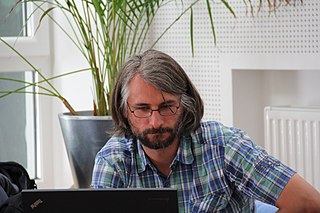
Computer science is the study of computation, information, and automation. Computer science spans theoretical disciplines to applied disciplines.
The Framework Programmes for Research and Technological Development, also called Framework Programmes or abbreviated FP1 to FP9, are funding programmes created by the European Union/European Commission to support and foster research in the European Research Area (ERA). Starting in 2014, the funding programmes were named Horizon.
The European Institute of Innovation and Technology (EIT) is an independent body of the European Union with juridical personality, established in 2008 intended to strengthen Europe's ability to innovate. The EIT’s three “core pillars” of activities are: entrepreneurial education programmes and courses across Europe that transform students into entrepreneurs; business creation and acceleration services that scale ideas and budding businesses; and innovation-driven research projects that turn ideas into products by connecting partners, investors, and expertise.
The Humanities Advanced Technology and Information Institute (HATII) was a research and teaching institute at the University of Glasgow in Scotland. It was established in 1997 with Professor Seamus Ross as Founding Director until 2009. HATII led research in archival and library science and in information/knowledge management. Research strengths were in the areas of humanities computing, digitisation, digital curation and preservation, and archives and records management.
The terms design computing and other relevant terms including design and computation and computational design refer to the study and practice of design activities through the application and development of novel ideas and techniques in computing. One of the early groups to coin this term was the Key Centre of Design Computing and Cognition at the University of Sydney in Australia, which for nearly fifty years pioneered the research, teaching, and consulting of design and computational technologies. This group organised the academic conference series "Artificial Intelligence in Design (AID)" published by Springer during that period. AID was later renamed "Design Computing and Cognition (DCC)" and is currently a leading biannual conference in the field. Other notable groups in this area are the Design and Computation group at Massachusetts Institute of Technology's School of Architecture + Planning and the Computational Design group at Georgia Tech.
In fluid dynamics and elasticity, hydroelasticity or flexible fluid-structure interaction (FSI), is a branch of science which is concerned with the motion of deformable bodies through liquids. The theory of hydroelasticity has been adapted from aeroelasticity, to describe the effect of structural response of the body on the fluid around it.
The Free Knowledge Institute (FKI) is a non-profit organisation founded in 2006 in the Netherlands. Inspired by the free software movement, the FKI fosters the free exchange of knowledge in all areas of society by promoting freedom of use, modification, copying, and distribution of knowledge about education, technology, culture, and science.
Amy Ashurst Gooch is a computer scientist known for her contributions in non-photorealistic rendering. She is currently the Chief Operations Officer at ViSOAR LLC, a data visualization research spin-off software company from the Scientific Computing and Imaging Institute. She is also an adjunct professor of computer science at Texas A&M University. Her current research is part of an interdisciplinary effort involving computer graphics, perceptual psychology, and computational vision. She is interested in better understanding the spatial information potentially available in CG imagery, determining what spatial cues are actually used when CG imagery is viewed, and using this information to create improved rendering algorithms and visualizations.

The first integration between mobile phone and Palm (PDA Personal Device Assistant) occurred in 1999, as a result of an Italian–lead project submitted to the action line V1.1 CPA1 "Integrated application platforms and services" 5th Framework Program of the European Community (project number IST1999-11100). The project, called MTM (Multimedia Terminal Mobile), was a multimedia platform, including both phone and PDA features; it also integrated the first miniature camera and a unidirectional microphone for video conferencing and commands interpretation through voice recognition. The creator and coordinator of the project, Alessandro Pappa, worked in a team with other European partners:
Scientific Research Publishing (SCIRP) is a predatory academic publisher of open-access electronic journals, conference proceedings, and scientific anthologies that are considered to be of questionable quality. As of December 2014, it offered 244 English-language open-access journals in the areas of science, technology, business, economy, and medicine.
Integromics was a global bioinformatics company headquartered in Granada, Spain and Madrid. The company had subsidiaries in the United States and United Kingdom, and distributors in 10 countries. Integromics specialised in bioinformatics software for data management and data analysis in genomics and proteomics. The company provided a line of products that serve gene expression, sequencing, and proteomics markets. Customers included genomic research centers, pharmaceutical companies, academic institutions, clinical research organizations, and biotechnology companies.

OMICS Publishing Group is a predatory publisher of open access academic journals. It started publishing its first journal in 2008. By 2015, it claimed over 700 journals, although about half of them were defunct. Its subsidiaries and brands include Allied Academies, Conference Series LLC LTD, EuroSciCon LTD, Hilaris Publishing, iMedPub LTD, International Online Medical Council (IOMC), Longdom Publishing SL, Meetings International, Prime Scholars, Pulsus Group, Research & Reviews, SciTechnol, Trade Science Inc, Life Science Events, Walsh Medical Media, and IT Medical Team.
Frontiers Media SA is a publisher of peer-reviewed, open access, scientific journals currently active in science, technology, and medicine. It was founded in 2007 by Kamila and Henry Markram. Frontiers is based in Lausanne, Switzerland, with offices in the United Kingdom, Spain, and China. In 2022, Frontiers employed more than 1,400 people, across 14 countries. All Frontiers journals are published under a Creative Commons Attribution License.

The high performance supercomputing program started in mid-to-late 1980s in Pakistan. Supercomputing is a recent area of Computer science in which Pakistan has made progress, driven in part by the growth of the information technology age in the country. Developing on the ingenious supercomputer program started in 1980s when the deployment of the Cray supercomputers was initially denied.

Jeffrey Beall is an American librarian and library scientist, who drew attention to "predatory open access publishing", a term he coined, and created Beall's list, a list of potentially predatory open-access publishers. He is a critic of the open access publishing movement and particularly how predatory publishers use the open access concept, and is known for his blog Scholarly Open Access. He has also written on this topic in The Charleston Advisor, in Nature, in Learned Publishing, and elsewhere.

Sebastian Schaffert is a software engineer and researcher. He was born in Trostberg, Bavaria, Germany on March 18, 1976 and obtained his doctorate in 2004.
Predatory conferences or predatory meetings are meetings set up to appear as legitimate scientific conferences but which are exploitative as they do not provide proper editorial control over presentations, the topics covered can diverge substantially from what has been advertised, and advertising can include claims of involvement of prominent academics who are, in fact, uninvolved. They are an expansion of the predatory publishing business model, which involves the creation of academic publications built around an exploitative business model that generally involves charging publication fees to authors without providing the editorial and publishing services associated with legitimate journals.

Maja Pantić is a Professor of Affective and Behavioural Computing at Imperial College London and an AI Scientific Research Lead in Facebook London. She was previously Professor of Affective and Behavioural Computing University of Twente and Research Director of the Samsung AI lab in Cambridge, UK. She is an expert in machine understanding of human behaviour including vision-based detection and tracking of human behavioural cues like facial expressions and body gestures, and multimodal analysis of human behaviours like laughter, social signals and affective states.
Adaptive Simulations is a Sweden-based organization that offers fully automated, cloud-based flow simulations and design optimization in a Software-as-a-Service model.
Geoffrey Broadbent was an English architect, academic and professor emeritus, and a prolific author in architectural theory, especially semiotics. He was head of the School of Architecture at Portsmouth Polytechnic, England, from 1967 until 1994, when he became professor emeritus. Among his best known works are the books Design in Architecture: Architecture and the Human Sciences (1973) and Emerging Concepts in Urban Space Design (1990). He was born in Huddersfield.








